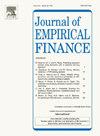用机器学习预测股票隐含波动率的经济价值
IF 2.4
2区 经济学
Q2 BUSINESS, FINANCE
引用次数: 0
摘要
我们通过比较机器学习模型的性能来评估非线性和交互效应在隐含波动率创新预测中的重要性,机器学习模型可以搜索相对于经典模型的交互效应,并在delta对冲期权收益的横截面和时间序列定价测试中衡量这些预测的经济意义。机器学习模型提供了卓越的样本外性能。由于预测变量在所有模型中都是相同的,这些性能差异可能捕捉到隐含波动率预测中非线性和交互效应的价值。我们的结果对前视偏差和模型过拟合具有鲁棒性。本文章由计算机程序翻译,如有差异,请以英文原文为准。
The economic value of equity implied volatility forecasting with machine learning
We evaluate the importance of nonlinear and interactive effects in implied volatility innovation forecasting by comparing the performance of machine learning models that can search for interactive effects relative to classical ones that cannot, measuring the economic significance of these predictions in cross-sectional and time series pricing tests of delta-hedged option returns. Machine learning models offer superior out of sample performance. Since the predictive variables are the same across all models, these performance differences likely capture the value of nonlinear and interactive effects in implied volatility forecasts. Our results are robust to look-ahead bias and model overfitting.
求助全文
通过发布文献求助,成功后即可免费获取论文全文。
去求助
来源期刊

Journal of Empirical Finance
Multiple-
CiteScore
3.40
自引率
3.80%
发文量
59
期刊介绍:
The Journal of Empirical Finance is a financial economics journal whose aim is to publish high quality articles in empirical finance. Empirical finance is interpreted broadly to include any type of empirical work in financial economics, financial econometrics, and also theoretical work with clear empirical implications, even when there is no empirical analysis. The Journal welcomes articles in all fields of finance, such as asset pricing, corporate finance, financial econometrics, banking, international finance, microstructure, behavioural finance, etc. The Editorial Team is willing to take risks on innovative research, controversial papers, and unusual approaches. We are also particularly interested in work produced by young scholars. The composition of the editorial board reflects such goals.
 求助内容:
求助内容: 应助结果提醒方式:
应助结果提醒方式:


